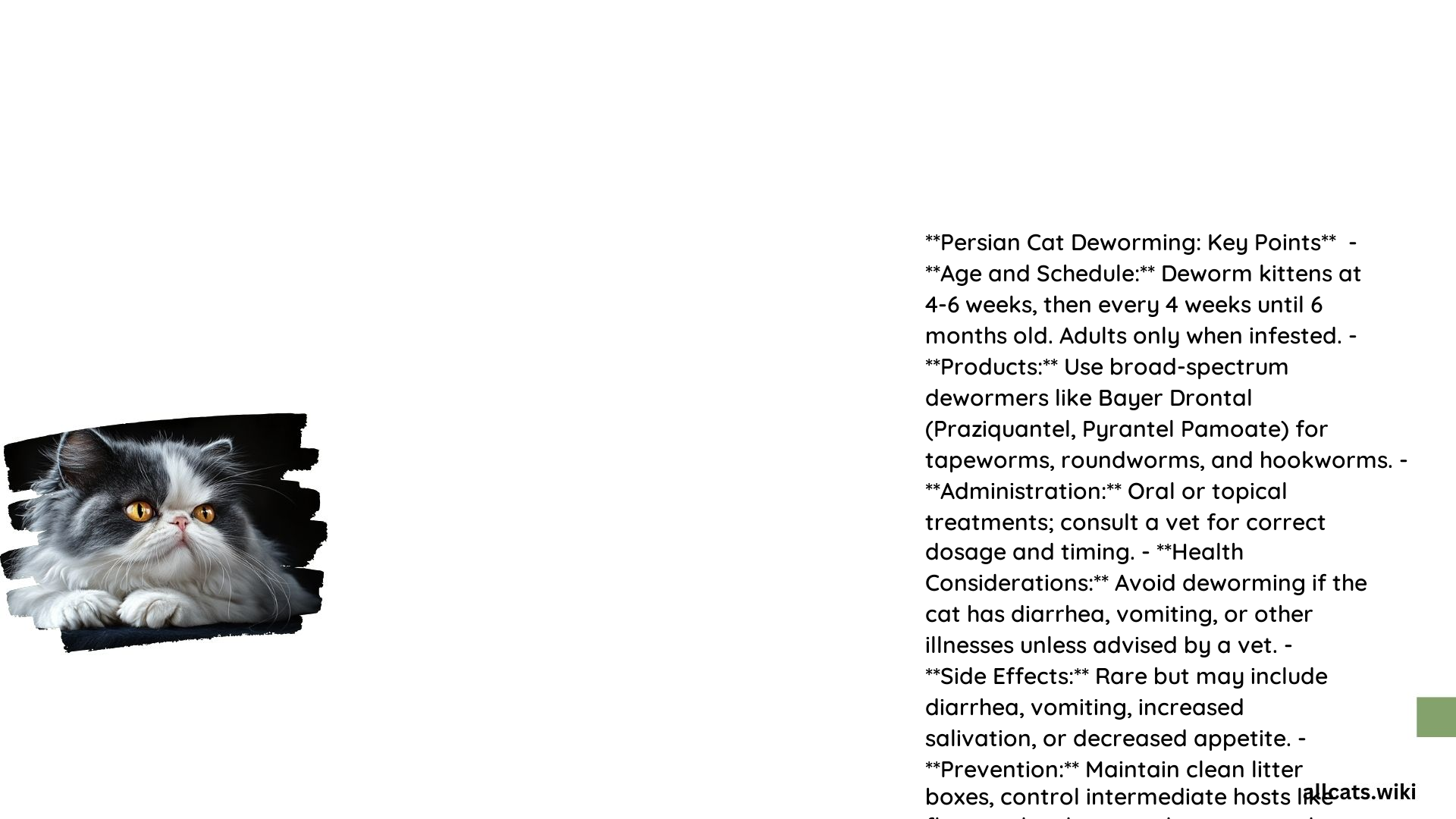Comprehensive Guide to Persian Cat Deworming
Deworming is an essential aspect of Persian cat care, as these felines are susceptible to various types of parasitic worms. This comprehensive guide will provide you with the necessary information to effectively deworm your Persian cat, including the types of dewormers, recommended schedules, best medicines, administration methods, and cost analysis.
What Types of Deworming Medicines are Available for Persian Cats?
Persian cats can be treated with a variety of deworming medicines, each targeting specific types of worms. These can be categorized into two main groups:
- Specific Worm Treatments: These dewormers target a particular type of worm, such as roundworms, tapeworms, or hookworms.
- Broad-Spectrum Products: These dewormers are effective against multiple types of worms in a single formulation. Common active ingredients in these products include Pyrantel pamoate and Praziquantel, which are effective against roundworms, hookworms, and tapeworms.
It’s important to note that while side effects are generally minimal, some cats may experience diarrhea, vomiting, or salivation after deworming. Consulting with your veterinarian is crucial to determine the best dewormer for your Persian cat’s specific needs.
What is the Recommended Deworming Schedule for Persian Cats?
The deworming schedule for Persian cats varies based on their age and living environment:
- Kittens: Deworming should start as early as 2-3 weeks of age and be repeated every 4-5 weeks until the kitten reaches 6 months of age. This helps prevent hookworm infection and other parasites.
- Adult Cats:
- Indoor Cats: Less frequent deworming may be necessary, but regular checks and treatments are still advised.
- Outdoor Cats: More frequent deworming (e.g., every 2-3 months) is recommended due to higher exposure to parasites.
It’s essential to consult with your veterinarian to determine the best deworming schedule for your Persian cat, as it may vary based on the local prevalence of parasites and your cat’s individual health status.
What are the Best Deworming Medicines for Persian Cats?
When it comes to deworming Persian cats, some of the most popular and effective brands include:
- Drontal: A broad-spectrum dewormer containing Pyrantel pamoate and Praziquantel, highly effective against multiple types of worms.
- Droncit: Specifically targets tapeworms with Praziquantel and is known for its ease of administration and effectiveness.
- Interceptor Flavor Tabs: An oral parasite preventive that covers a range of parasites, including heartworms.
It’s crucial to consult with your veterinarian to determine the best dewormer for your Persian cat based on their specific needs and the local prevalence of parasites.
How to Administer Deworming Medicine to Persian Cats?
Deworming medicines for Persian cats can be administered in various ways, including:
- Tablets: Can be given directly or mixed with food. Palatable tablets are available to make administration easier.
- Wormer Pastes: Given orally, these can be more palatable for cats.
- Spot-On Formulations: Applied to the skin on the back of the neck.
- Injectable Versions: Administered by a veterinarian in certain situations.
To ensure cooperation and minimize stress, it’s recommended to:
– Mix the dewormer with a small amount of tasty food to make it more appealing.
– Introduce the dewormer gradually to prevent stress.
– Reward your cat with treats or praise after administering the dewormer.
What is the Cost of Deworming Medicines for Persian Cats?
The cost of deworming medicines for Persian cats can vary depending on the product and brand. On average, you can expect to pay:
- Drontal and Droncit tablets: $10 to $30 per treatment.
- Topical solutions: May be more expensive.
In addition to the cost of the dewormer itself, you may also need to factor in the cost of veterinary consultations for fecal tests and advice on the best dewormer for your Persian cat.
It’s important to note that while deworming is an essential aspect of Persian cat care, it’s crucial to monitor your cat’s behavior and watch for any adverse reactions, such as diarrhea, vomiting, or salivation. If these symptoms persist or worsen, consult your veterinarian immediately.
Reference Links
- How To Deworm A Cat – Cats.com
https://cats.com/how-to-deworm-a-cat - The 5 Best Cat Dewormers of 2024 – Business Insider
https://www.businessinsider.com/guides/pets/best-cat-dewormer - Roundworms In Cats And Kittens – Veterinary Partner – VIN
https://veterinarypartner.vin.com/default.aspx?id=4951385&pid=19239

